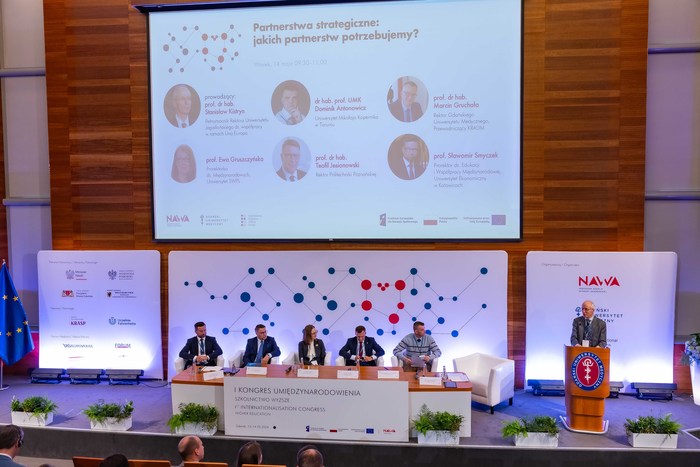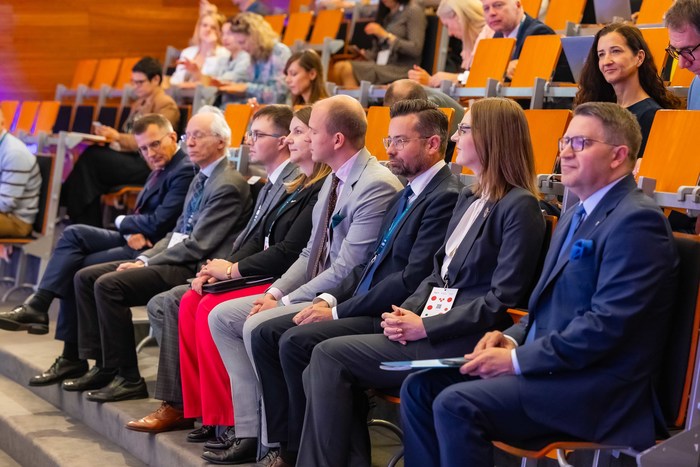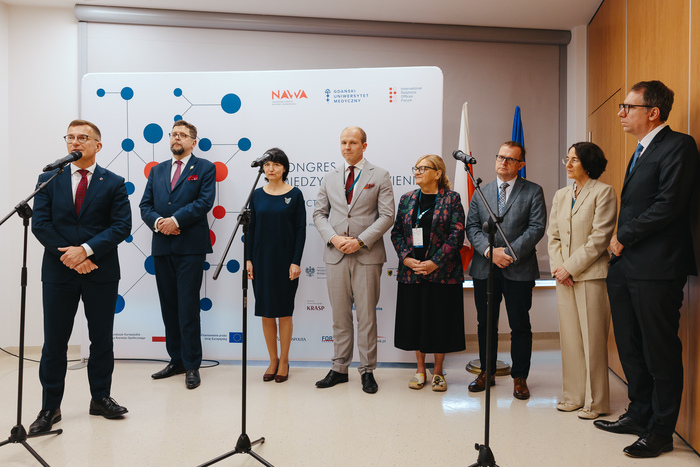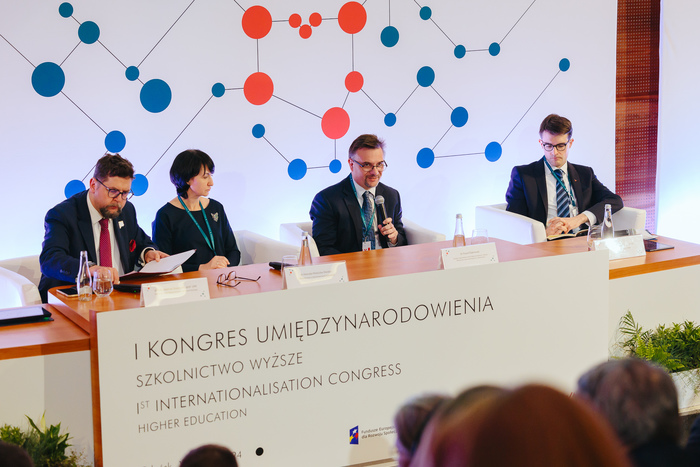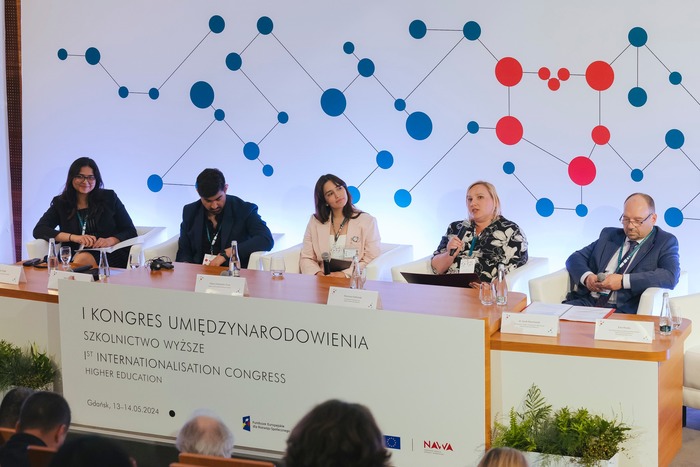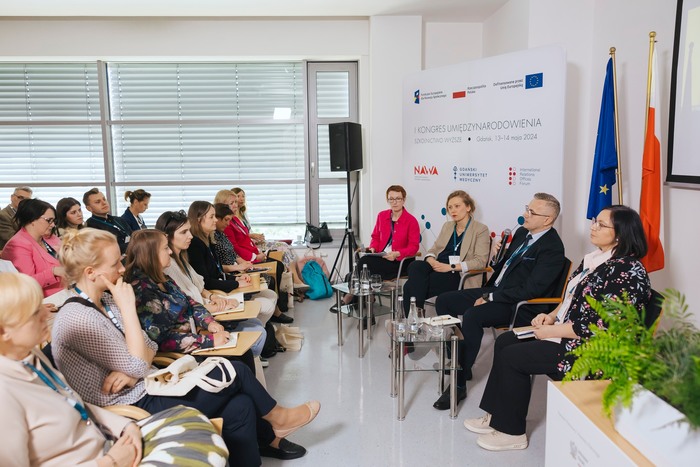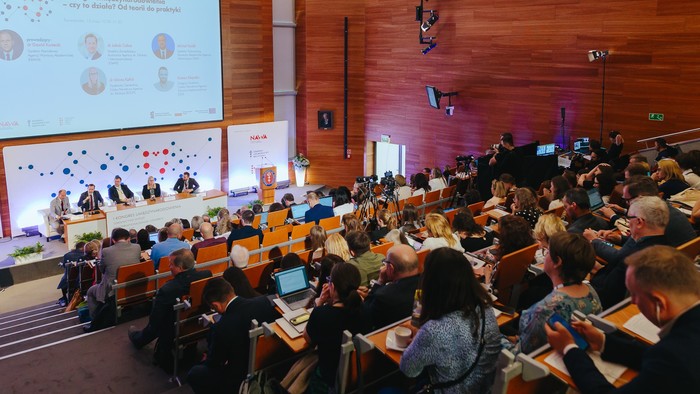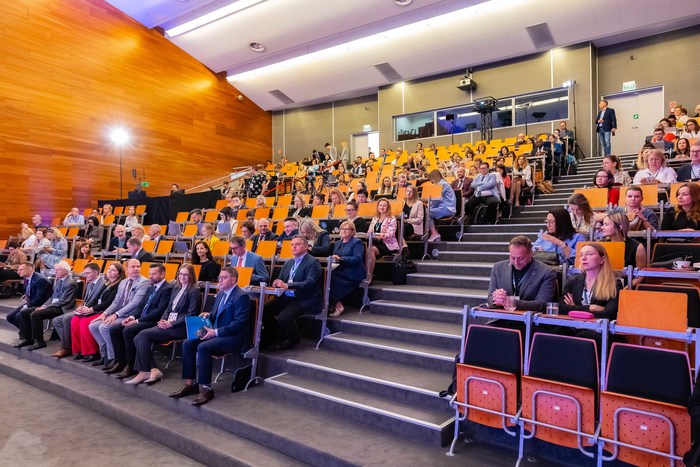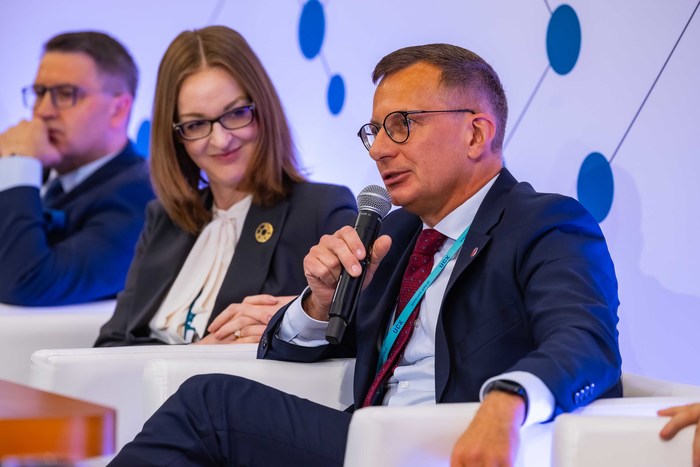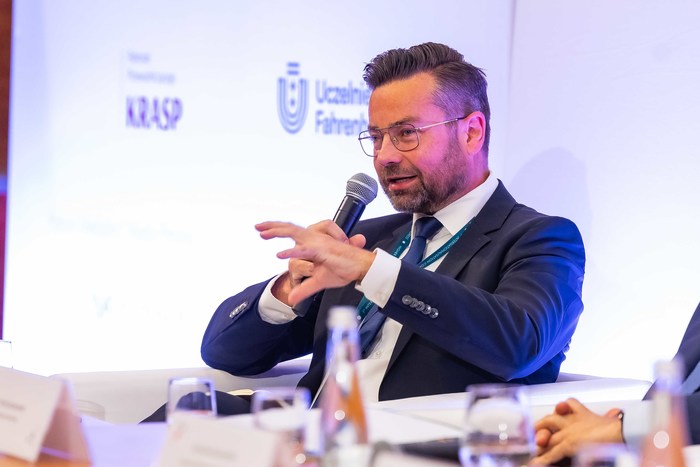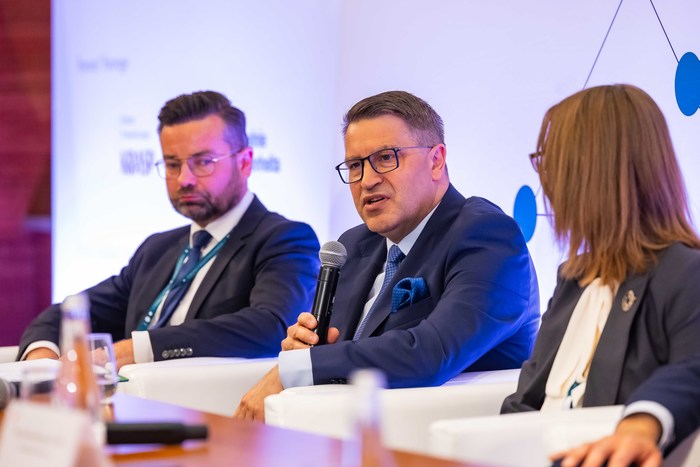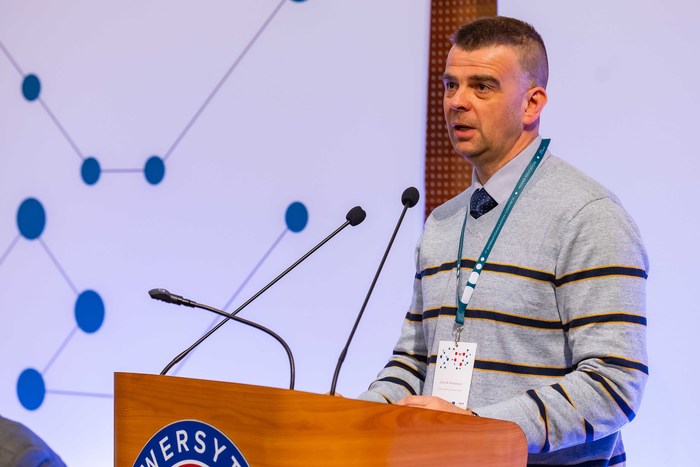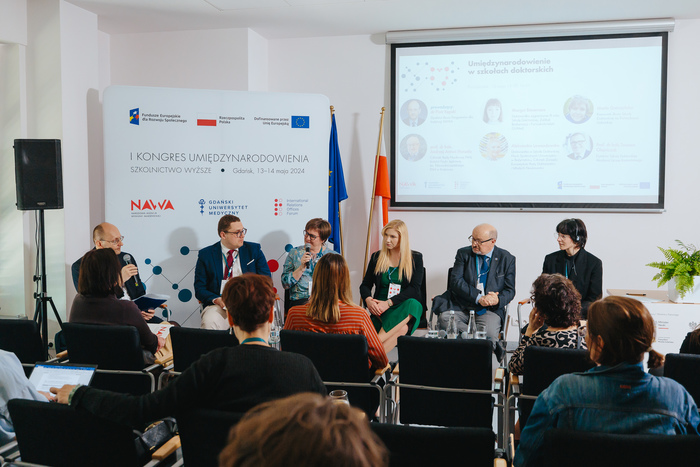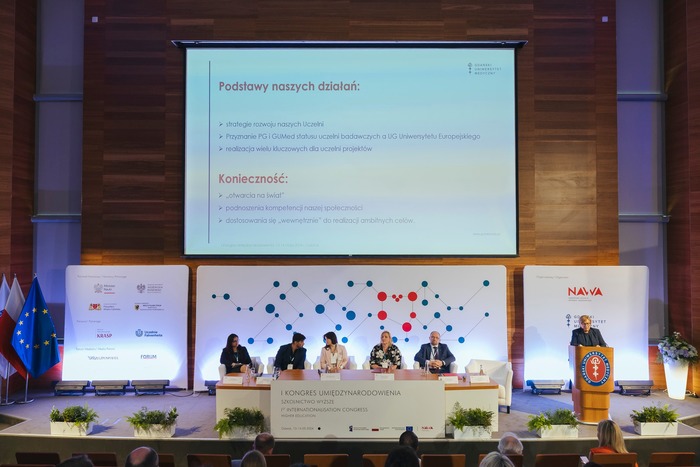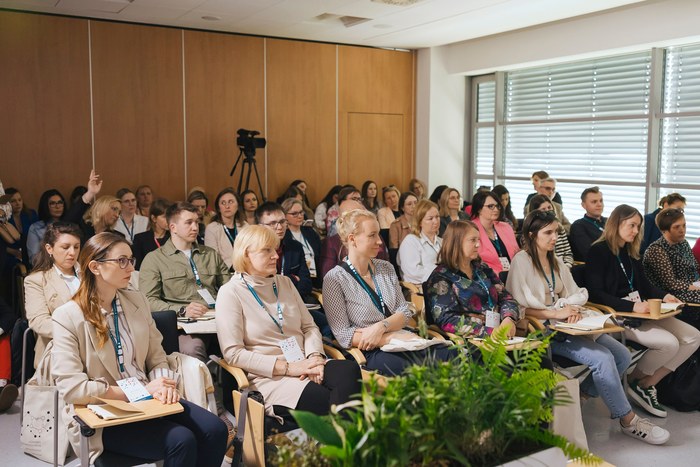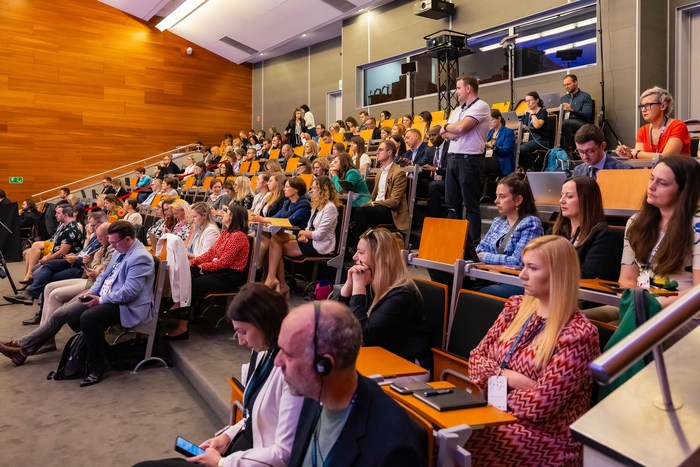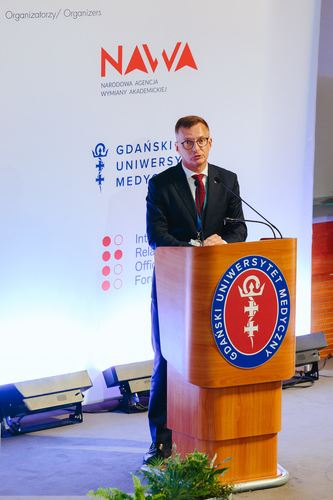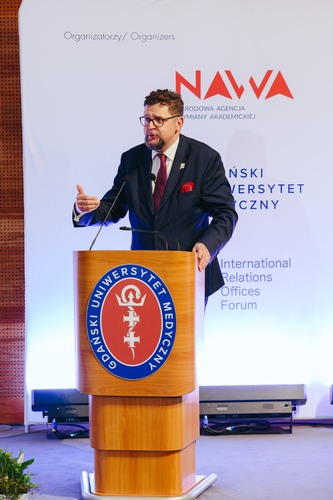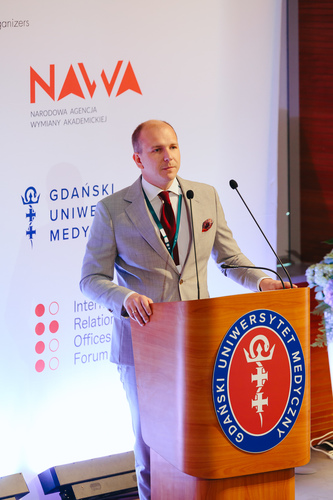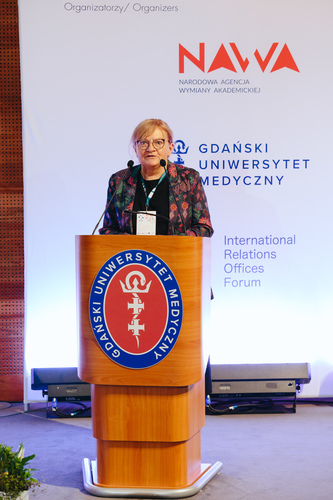The 1st Internationalization Congress took place in Gdańsk
16.05.2024
Nearly 300 participants on-site and over 150 online took part in the 1st Internationalization Congress, which was organized on 13th-14th of May 2024 by: the National Agency for Academic Exchange (NAWA), the Medical University of Gdańsk and the IROs Forum. The event opened a broad debate with the academic community on how to wisely manage the internationalization of education at Polish universities. 48 panelists from 14 countries took part in the two-day discussion.
– For higher education and science, internationalization is something natural, because science, by its very nature, seeks the truth, and the truth is universal. It has neither nationality nor political orientation, therefore it must be sought globally – said Prof. Marcin Gruchała, Rector of the MUG.
The event was attended by the deputy ministers of science, foreign affairs and interior affairs and administration – Prof. Andrzej Szeptycki, Henryka Mościcka-Dendys, Ph.D. and Prof. Maciej Duszczyk.
– The internationalization of science and higher education is essential. To achieve the best results in science and education, we need cooperation. We must attract foreign lecturers or send our students to other research centers, as well as accept students and Ph.D. students from other countries – noted Prof. Andrzej Szeptycki, Deputy Minister of Science. – This allows us to develop our science and higher education. This also builds the position of our country as an academic center, but also contributes to building its image of soft power in the international arena.
The participants of the debate discussed internationally the recommendations for Poland, which, under the auspices of NAWA, is working on a national strategy for the internationalization of science and higher education.
– If this document is to bring benefits to all stakeholders, we need an intersectoral debate. This would not be possible without the involvement of our friends from the United States, Great Britain, the Netherlands, Germany, Finland, Austria, the Czech Republic and Slovakia, because thanks to the fact that they gathered in Gdańsk, we can discuss and use their valuable experiences in the strategy creation process emphasized Dawid Kostecki, Ph.D., Director of NAWA during press conference.
Many aspects of the functioning of Polish universities were discussed during the Congress. One of the key topics of discussion were joint study programs or double diplomas, which have become an important tool to support cooperation between educational institutions around the world.
– From the perspective of the Ministry of Foreign Affairs, the issue of the quality of the process and ensuring that people who actually want to study here come to Poland. From the Polish point of view, we are interested in ensuring that the internationalization of Polish universities is accompanied by the fact that people who come to Poland to study actually undertake studies – added Henryka Mościcka-Dendys, Undersecretary of State at the Ministry of Foreign Affairs.
Particular attention was also paid to the benefits of internationalizing research and education programs, both in terms of what is common and what is different, including: cultural, linguistic and administrative. Good practices in cooperation with foreign partners and prospects for the development of international research and international education programs in Poland in the context of globalization of education and changing labor market needs were presented.
– Internationalization has always been very important for our University and will remain so and will even be strengthened – announced the Rector-Elect Prof. Michał Markuszewski. – Innovation and knowledge most often come in an international environment. We will do everything to strengthen our internationalization and focus on programs that will improve it.
Foreign students studying at the Medical University of Gdańsk also took part in the discussion. Shraddha Singh, Mayra Alejandra Vivas and Abhishek Singla talked about their experiences of staying in Poland and studying at the university in Gdańsk, legalizing their stay, and also introduced initiatives supporting the integration of members of the academic community.
– From the perspective of the last five years that I spent in Gdańsk and at the University, I notice that when I first came here, many things were missing in terms of internationalization. However, our lecturers and students have jointly implemented several important initiatives, such as: organization of numerous conferences. The MUG has developed a lot in recent years, and we are heading towards internationalization. The student community is very strong – said Abhishek Singla, 4th year medical-ED student.
During the Congress, the procedure for supporting the foreign part of the community was also presented, which was developed by a team of employees of the international cooperation offices of the Fahrenheit Association Universities. It was also an opportunity to exchange experiences in building relationships in an intercultural and international environment, influencing effective adaptation, increasing the number of students, doctoral students, teachers and scientists from abroad, which is an element of the quality policy, building the university’s brand and strengthening visibility.
– The entire world of higher education attaches great importance to internationalization. Those countries whose universities are highly positioned in world rankings and recognized as those that offer high quality education consider higher education to be a vehicle for building the future of the country and attracting talent – said Ewa Kiszka, M.A., head of the MUG’s Intenrationalization Office. – I am proud, as the chairwoman of the IROs Forum, that I can represent professional staff, i.e. those people who in international cooperation offices strive every day to achieve the ambitions and goals contained in the internationalization and development strategies of our universities.
The 1st Internationalization Congress was carried out as part of the project entitled Strategy for the internationalization of Polish higher education and science from the European Funds for Social Development: Measures FERS.01.05 Skills in higher education. The value of the project is: PLN 9,993,687.96.

Photos by Paweł Sudara/MUG, NAWA
Archives
- Academic Year 2024/2025
- Academic Year 2023/2024
- Academic Year 2022/2023
- Academic Year 2021/2022
- Academic Year 2020/2021
- Academic Year 2019/2020
- Academic Year 2018/2019
- Academic Year 2017/2018
- Academic Year 2016/2017
- Academic Year 2015/2016
- Academic Year 2014/2015
- Academic Year 2013/2014
- Academic Year 2012/2013
